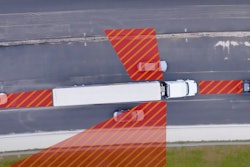The California Advanced Clean Fleets (ACF) regulation, which began being implemented on January 1, 2024, is designed to complement the Advanced Clean Trucks (ACT) rule, which mandates a significant increase in the number of medium- and heavy-duty zero-emission vehicles (ZEVs) on California roads. There’s much to understand about the regulation and how it will impact fleets of all sizes.
ACF is part of the California Air Resources Board's (CARB) broader strategy to ensure a cleaner environment. This mandate will reshape the landscape for fleets of all sizes. This overview will provide an understanding of the ACF regulation, emphasizing the need for early action and strategic planning to ensure compliance and contribute to environmental sustainability.
Understanding the Advanced Clean Fleets regulation
Implemented on April 28, 2023, the ACF regulation is a move by the California Air Resources Board (CARB) to transition the state's medium- and heavy-duty trucking sector to zero-emission vehicles (ZEVs) by 2045, supporting CARB's objectives to counteract climate change and enhance air quality. Starting in 2024, this regulation mandates a broad spectrum of fleets - including those deemed high-priority, drayage, and public fleets - to systematically incorporate ZEVs into their operations.
This regulation represents a crucial step in California's commitment to a sustainable, zero-emission transportation future, emphasizing the need for businesses to adapt and innovate in response to evolving environmental mandates.
Who needs to comply?
The regulation targets on-road vehicles with a Gross Vehicle Weight Rating (GVWR) greater than 8,500 pounds, off-road yard tractors, and light-duty mail and package delivery vehicles part of fleets with 50 vehicles or more. It applies not just to vehicles registered in California but also to those entering the state from elsewhere, treating them as part of the California fleet for the entirety of the calendar year they operate within the state.
Impact on fleets nationwide
Starting January 1, 2024, the ACF regulation will affect any fleet conducting business in California. High Priority fleets—entities owning, operating, or having control over at least one vehicle in California and either generating $50 million or more in gross annual revenue or controlling 50 or more vehicles—must adhere to specific reporting and compliance mandates.
Compliance pathways and reporting
Fleets have two primary options for compliance: the Model Year Schedule and the Zero Emission Milestone Phase-In Pathway. Each pathway has its own set of deadlines and requirements, with the initial reporting due by February 1, 2024. Additionally, manufacturers face a sales mandate to sell only ZEVs for Class 2b-8 vehicles starting in 2036.
Extensions and penalties
Recognizing potential challenges in meeting compliance deadlines, CARB allows for a vehicle delivery delay extension under certain conditions. However, fleets that fail to meet their ZEV milestones risk incurring penalties of up to $10,000 per day per violation, underscoring the importance of early and proactive planning.
Financial incentives
Financial incentives and grants are available to alleviate the costs associated with purchasing ZEVs and developing charging or refueling infrastructure. These include the Clean Vehicle Rebate Project (CVRP), Clean Cars 4 All, California Clean Fuel Reward, and Community Air Protection Program, among others, designed to support businesses of all sizes in adopting clean transportation solutions.
Navigating the transition
For fleet managers, navigating the ACF regulation requires a strategic approach. This includes understanding the specific requirements applicable to their fleets, evaluating the available compliance pathways, and planning vehicle acquisitions accordingly. The transition to ZEVs, while challenging, offers an opportunity to contribute to a sustainable future and potentially realize long-term operational savings.
TurnPoint Services, which is home to a network of brands that provide HVAC, regulations plumbing, and electrical services to both residential and commercial customers throughout North America, is evaluating how to meet the requirements of the ACF regulation. The company is working with Merchants Fleet to navigate the process of acquiring, evaluating, and putting EVs into service for their California locations.
“The California Advanced Clean Fleets regulation will be challenging to meet as we look at options for vehicles that meet the needs of our fleet and how to integrate them into our expanding operations,” said Adam Nesbitt, vice president of procurement for Turnpoint Services. “We are collaborating with Merchants Fleet to find solutions that meet the needs of our various fleets and their specific industries. This includes how trucks and vans are upfitted, work and travel requirements and grants and incentives from federal, state and local governments.”













